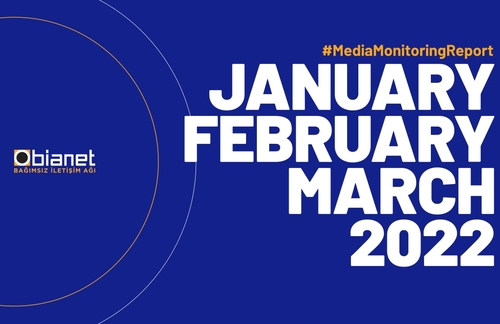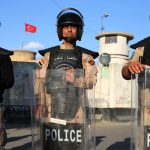Remarkable objections are being raised against the condemnation of the entire society of Turkey to univocality alongside its democratic community and critical media with various court rulings, press card regulations, public ad sanctions and media watchdog RTÜK’s fines.
Issued on May 3 World Press Freedom Day, the BİA Media Monitoring Report covering January, February and March 2022 gives some positive news from local courts, appeals courts and Court of Cassation:
Arrested for some time for “organization membership” over the news regarding the torture of two people in Van’s Çatak, four journalists were acquitted. Journalists Namık Koçak and Aslı Erdoğan were acquitted of “propagandizing for a terrorist organization” and Etkin News Agency (ETHA) translator Meşale Tolu was acquitted of “organization membership”.
The Court of Cassation overturned the 5-month prison sentence of Evrensel newspaper’s the-then executives Çağrı Sarı and Arif Koşar, who had been sentenced to prison on charge of “humiliating the armed forces” over the news report “Police raked the people in Nusaybin: 3 wounded”.
However, the fact that media representatives are still arrested and put on trial for “insulting the President”, that President and ruling Justice and Development Party (AKP) Chair Recep Tayyip Erdoğan and his son-in-laws Selçuk Bayraktar and Berat Albayrak come to the fore as the complainants or the intervening parties of the lawsuits of damages and penal cases against journalists, that attacks are carried out against journalists ahead of the 2023 elections in a way reminiscent of the period leading up to the 2019 local elections and that the Radio and Television Supreme Council (RTÜK) threaten critical national channels and international news websites show that the attempts to condemn the public to univocality continue.
That the government handed over the trial over the murder of journalist Jamal Khashoggi to “murderous” Saudi Arabia after accusing its Crown Prince Mohammed bin Salman Al Saud for 2 years reminded one of the fate of the trials over the murder of journalists Musa Anter and Uğur Mumcu, abandoned to impunity as there has remained no “state will”.
8 attacks in 2 months, 2nd murder in 2 years
In the period of January-February-March 2022, at least six journalists and one media outlet were attacked and one journalist lost his life in an armed attack in Turkey: Güngör Arslan, the owner of the local Ses Kocaeli Newspaper, was targeted by bullets in his office after he had reported on the allegations of corruption in tender. 10 people, including assailant Ramazan Özkan, were arrested. This has marked the second murder of a journalist committed in Turkey in the last 2 years.
* Güngör Arslan
Some of the attacks launched in this period leading up to the 2023 general elections were unfortunately reminiscent of the spiral of violence faced by journalists in the national and local media critical of the ruling “People’s Alliance” in the aftermath of the 2019 local elections. In Konya, journalist Umut Yaygır and Özcan Saraç were attacked by a group of 10-15 people, including the head of the Ereğli Branch of ultranationalist Idealist Hearths.
In the same period last year, media representatives were targeted in 13 physical attacks in İstanbul, Bursa, Aydın, Aksaray and Rize. In one, radio presenter Hazım Özsu was killed by a person from his audience on the grounds that “he did not like his comments.”
6 journalists detained
At least six journalists were detained in the period of January-February-March 2022. Receiving an anonymous tipoff alleging that “they would stir up trouble on Newroz” ahead of the Diyarbakır Newroz, the police held journalists Ertuş Bozkurt and Mikail Barut in detention for 3 days. Journalist Can Uğur from BirGün newspaper was detained at İstanbul Sabiha Gökçen Airport for “insulting the President” as part of a file from 2015.
‘Insulting President’: 1 arrested-convicted, 17 on trial
In January-February-March 2022, at least 17 journalists and cartoonists (Julien Serignac, Gerard Biard, Laurent Sorurisseau, “Alice”, Hasan Cemal, Deniz Yücel, Rüstem Batum (2), Mehmet Emin Kurnaz, Burak Şahin, Sedef Kabaş, Gökhan Biçici, Atilla Taş, Erk Acarer, Hayko Bağdat, Engin Korkmaz, Baransel Ağca, Ahmet Sever) faced 79 years, 4 months in prison in total for “insulting the President” over their opinions and criticism about Erdoğan.
While there are the Venice Commission resolution recommending the annulment of the article on “insulting the President” and the conviction by the European Court of Human Rights in the Vedat Şorli vs. Turkey case in October 2021, this time, journalist Sedef Kabaş’s imprisonment for 49 days and a prison sentence of 2 years, 4 months were unfortunately the case.
* Sedef Kabaş
In the same period, the appeals court upheld the prison sentence of Cem Şimşek, the former managing director of Evrensel newspaper. Four executives of the closed Özgür Gündem newspaper took their convictions to the Court of Cassation. The only positive news in this context was the acquittal of journalist Gökhan Biçici.
All in all, from August 2014, when Erdoğan was elected the President for the first time, to April 1, 2022, at least 70 journalists were given prison sentences, deferred prison sentences and judicials fines for “insulting the President” as per the Article 299 of the Turkish Penal Code (TCK).
In the same period last year, 18 journalists and five cartoonists were on trial on this charge while the conviction of Ayten Akgün and the acquittal of Fatih Portakal, Oktay Candemir, Burak Şahin and cartoonist Sefer Selvi were the case. However, the cases do not end over time, given that new ones are constantly added to the “defendants” of the President.
Journalists’ complainants: Government, high judiciary
In the period of January-February-March 2022, at least 23 journalists were put on trial on charge of “insult” in penal cases. While one journalist was convicted, two journalists were acquitted of the offense charged.
Among the ones who demanded prison sentences for journalists were President Erdoğan’s son Bilal Erdoğan, Presidency’s Communications Director Fahrettin Altun, Judge Bekir Altun, Nationalist Movement Party (MHP) Chair Devlet Bahçeli, Interior Minister Süleyman Soylu, Minister of Transport and Infrastructure Adil Karaismailoğlu, last Prime Minister and AKP Deputy Chair Binali Yıldırım, Parliamentary Speaker Mustafa Şentop, Minister of Industry and Technology Mustafa Varank, Kadiri Religious Sect leader Büreyde Öncel, former Parliamentary Speaker İsmail Kahraman, AKP founders İhsan Arslan and Ali İhsan Arslan, the then Chief Public Prosecutor of the Court of Cassation Abdurrahman Yalçınkaya, the then Deputy Chief Public Prosecutor of İstanbul and Vice Justice Minister Hasan Yılmaz, the then Deputy Chief Public Prosecutor of İstanbul Hacı Hasan Bölükbaşı, Judge Hacım Çiftçi, Deputy Chair of the Wushu Federation of Turkey Abdurrahman Akyüz, his daughter Elif Akyüz and one other person who was on trial on charge of “child abuse”.
Living in Germany, journalist Deniz Yücel from Die Welt newspaper was sentenced to pay a judicial fine of 7,080 lira in absentia on the grounds that he allegedly “insulted” Hasan Yılmaz, the then Deputy Chief Public Prosecutor of İstanbul and Vice Minister of Justice, with a tweet.
Arrested on January 22 and held in prison for 49 days, journalist Sedef Kabaş was sentenced to prison for “insulting the President”; at the same hearing, she was acquitted of “insulting” Minister of Interior Süleyman Soylu and Minister of Transport and Infrastructure Adil Karaismailoğlu. Journalist Caner Taşpınar was acquitted of “insulting” former Parliamentary Speaker İsmail Kahraman and AKP founders İhsan Arslan and Ali İhsan Arslan.
Erdoğan and his sons-in-law want 850 thousand lira from five reporters
In the first three months of 2022, the names of President Erdoğan and his sons-in-law Selçuk Bayraktar and Berat Albayrak, the former Minister of Treasury and Finance, were in lawsuits for damages filed against three journalists (Çiğdem Toker, Şirin Payzın, Sedef Kabaş, Mustafa Sönmez and Hazal Ocak) and three media outlets (Halk TV, Tele1 and Sözcü), demanding 850 thousand lira in total.
In this period, President Erdoğan also filed a lawsuit for damages for “attack on personal rights,” demanding 250 thousand lira from Sedef Kabaş, whom he caused to be arrested, and Fırat Sakar, a Tele1 official. Journalist Çiğdem Toker and Sözcü newspaper, who published the “Report on the IMM’s Service to Foundations” about the previous İstanbul Metropolitan Municipality administration, were sentenced to pay 30 thousand lira in compensation in a case filed with a request of 80 thousand lira. The court found the 100 thousand lira lawsuit for damages that Selçuk Bayraktar and the Baykar Makine company, of which he is an executive, filed against Mustafa Sönmez for a tweet was unjustifiable. Former Gaziantep Metropolitan Mayor Asım Güzelbey demands 100 thousand lira in compensation from Ruhi Aytaç, the rights holder of the Gaziantep Haber newspaper.
Impunity: Mercy not for journalists but for assailants
Recently, especially the judiciary gave decisions that encourage those target media representatives on the streets because of their reports and opinions: The sentence for “wilful injury” given to two of the people in the group that attacked journalist Levent Gültekin in front of the Halk TV studio in Bakırköy, İstanbul, was deferred considering “their social relationships and the possible impact of the sentence on their future.” Similarly, Yeniçağ Newspaper columnist Yavuz Selim Demirağ, who was heavily attacked by a group at night on May 10, 2019, in Ankara, can’t find a court to put the defendants on trial. Recently, the Ankara 26th Heavy Penal Court and the Ankara 54th Heavy Penal Court passed the buck to each other.
The case concerning the killing of Musa Anter in 1992 will drop due to the statute of limitations if a verdict is not given until September. Also, the Umut Case, which includes the killing of several journalists and intellectuals, including the killing of Uğur Mumcu, Bahriye Üçok, Muammer Aksoy and Ahmet Taner Kışlalı, continues to hurt people’s conscience.
Bans on 50 online news articles, tax audit for a journalist
In January, February and March, access to at least 50 online news articles or journalists’ posts about topics such as bribery, corruption, drug smuggling, “FETÖ connections,” “security,” allegations about municipalities run by the ruling party and prisoner letters were banned by verdicts of Penal Judgeships of Peace. Among the journalists whose articles or social media posts were interfered with are Barış Terkoğlu, Barış Pehlivan, Bülent Mumay, Murat Ağırel, Erk Acarer and Can Dündar.
The Ministry of Treasury and Finance’s tax investigation against journalist and economist Mustafa Sönmez, who criticizes the government’s economy management, became one of the new types of interference aimed at silencing. Also, teachers working at public schools cannot access www.diken.com.tr website using the Ministry of National Education’s internet connection.
Constitutional Court verdicts on public ads and internet censorship
In January, February and March, the Constitutional Court gave two important verdicts about the Press Advertisement Institution (BİK) depriving critical newspapers of public ads for years and internet censorship aimed at silencing online reporting, especially originating from Penal Judgeships of Peace.
In one of these verdicts, the Constitutional Court considered the access blocks on some news articles on Birgün, Gazete Duvar, Artı Gerçek, Sol.org.tr, Diken and Tarımdanhaber websites and a column article of Çiğdem Toker on Cumhuriyet newspaper “violation of Constitutional rights” and ruled each of these outlets should be paid 8,100 lira in compensation, amounting to 48 thousand 600 lira in total. Also, the Constitutional Court rejected an application about journalist Sedef Kabaş, who was arrested on January 22 on charges of “insulting the president” and “insulting a public official” because of a statement on TV.
In the same period last year, the Constitutional Court sentenced the government to pay 84 thousand 395 lira in compensation in the applications of four journalists for freedom of expression.
The ECtHR sentenced Turkey to pay 14,650 Euro
In the files it put on its agenda in the January-March period, the European Court of Human Rights (ECtHR) ruled by 5 votes to 2 that Die Welt reporter Deniz Yücel’s one-year arrest in Turkey was a “violation of freedom of expression and right to security” and sentenced Turkey to pay 13 thousand 300 Euro in compensation. However, the attorney of Yücel and MLSA Co-Director Lawyer Veysel Ok stated that they would bring the case to the Grand Chamber, saying that “his arrest was politically motivated.”
The ECtHR concluded that the presumption of innocence was violated in the case of Zehra Doğan, an editor for the Jin News Agency (JİNHA) and an artist who was forced to sign a petition about “leaving the organization” even though she had not been put in prison for “being a member of an illegal organization” and ruled that Turkey should pay 1,350 Euro to Doğan. The ECtHR rejected the application of Wikipedia, which had been closed in Turkey for nearly three years, saying that “The Constitutional Court compensated, you are no longer aggrieved.”
In the same period last year, the ECtHR ruled that Turkey should pay 15 thousand 450 Euro in compensation for the arbitrary arrest of columnist Atilla Taş.
RTÜK fines TV and radio outlets 20,868,514 lira
In the January, February March 2022 period, the Radio and Television Supreme Council (RTÜK), fined TV outlets 59 times and radio outlets 2 times for news and programs. The council fined TV outlets 20,868,514 lira in total and radio outlets 11,517 lira in total.
In the same period last year, TV outlets were given 57 administrative monetary fines and 22 broadcast suspension penalties, amounting to 7 million 91 thousand 592 lira in total.
Five dismissals and resignations in three months
In the January-February-March period, at least five media representatives were fired or had to leave their jobs because of disagreements caused by media outlets’ editorial lines. This figure was nine in the same month last year.
Halk TV parted ways with Özlem Gürses and Emin Çapa and Cumhuriyet newspaper parted ways with Mine Esen, a 24-year employee who was in charge of the Foreign News Service. In Elazığ, Faik Akgün, the managing editor of Günışığı newspaper, was dismissed after reporting on Enes Kara, a medical student who killed himself in the dormitory belonging to a religious community where he had been forced by his family to stay. Cansu Çamlıbel, who resigned three years ago as the Washington representative of Hürriyet newspaper, won the case she filed against the Demirören Media Group.
(SA-EÖ/NÖ/SD-VK)
Source:Bianet
***Show us some LOVE by sharing it!***



